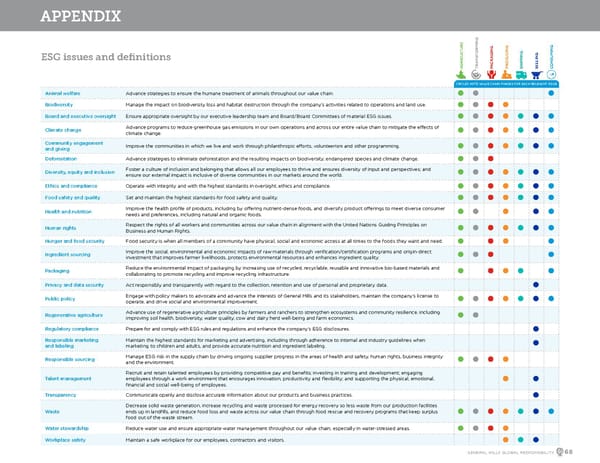APPENDIX ESG issues and definitions Animal welfare Advance strategies to ensure the humane treatment of animals throughout our value chain. Biodiversity Manage the impact on biodiversity loss and habitat destruction through the company’s activities related to operations and land use. Board and executive oversight Ensure appropriate oversight by our executive leadership team and Board/Board Committees of material ESG issues. Climate change Advance programs to reduce greenhouse gas emissions in our own operations and across our entire value chain to mitigate the effects of climate change. Community engagement and giving Improve the communities in which we live and work through philanthropic efforts, volunteerism and other programming. Deforestation Advance strategies to eliminate deforestation and the resulting impacts on biodiversity, endangered species and climate change. Diversity, equity and inclusion Foster a culture of inclusion and belonging that allows all our employees to thrive and ensures diversity of input and perspectives; and ensure our external impact is inclusive of diverse communities in our markets around the world. Ethics and compliance Operate with integrity and with the highest standards in oversight, ethics and compliance. Food safety and quality Set and maintain the highest standards for food safety and quality. Health and nutrition Improve the health profile of products, including by offering nutrient-dense foods, and diversify product offerings to meet diverse consumer needs and preferences, including natural and organic foods. Human rights Respect the rights of all workers and communities across our value chain in alignment with the United Nations Guiding Principles on Business and Human Rights. Hunger and food security Food security is when all members of a community have physical, social and economic access at all times to the foods they want and need. Ingredient sourcing Improve the social, environmental and economic impacts of raw materials through verification/certification programs and origin-direct investment that improves farmer livelihoods, protects environmental resources and enhances ingredient quality. Packaging Reduce the environmental impact of packaging by increasing use of recycled, recyclable, reusable and innovative bio-based materials and collaborating to promote recycling and improve recycling infrastructure. Privacy and data security Act responsibly and transparently with regard to the collection, retention and use of personal and proprietary data. Public policy Engage with policy makers to advocate and advance the interests of General Mills and its stakeholders, maintain the company’s license to operate, and drive social and environmental improvement. Regenerative agriculture Advance use of regenerative agriculture principles by farmers and ranchers to strengthen ecosystems and community resilience, including improving soil health, biodiversity, water quality, cow and dairy herd well-being and farm economics. Regulatory compliance Prepare for and comply with ESG rules and regulations and enhance the company’s ESG disclosures. Responsible marketing and labeling Maintain the highest standards for marketing and advertising, including through adherence to internal and industry guidelines when marketing to children and adults, and provide accurate nutrition and ingredient labeling. Responsible sourcing Manage ESG risk in the supply chain by driving ongoing supplier progress in the areas of health and safety, human rights, business integrity and the environment. Talent management Recruit and retain talented employees by providing competitive pay and benefits; investing in training and development; engaging employees through a work environment that encourages innovation, productivity and flexibility; and supporting the physical, emotional, financial and social well-being of employees. Transparency Communicate openly and disclose accurate information about our products and business practices. Waste Decrease solid waste generation, increase recycling and waste processed for energy recovery so less waste from our production facilities ends up in landfills, and reduce food loss and waste across our value chain through food rescue and recovery programs that keep surplus food out of the waste stream. Water stewardship Reduce water use and ensure appropriate water management throughout our value chain, especially in water-stressed areas. Workplace safety Maintain a safe workplace for our employees, contractors and visitors. CONSUMING SELLING SHIPPING PRODUCING PACKAGING TRANSFORMING AGRICULTURE CIRCLES NOTE VALUE CHAIN PHASES FOR EACH RELEVANT ISSUE GENERAL MILLS GLOBAL RESPONSIBILITY 68
 GeneralMills Global Responsibility Report Page 69 Page 71
GeneralMills Global Responsibility Report Page 69 Page 71